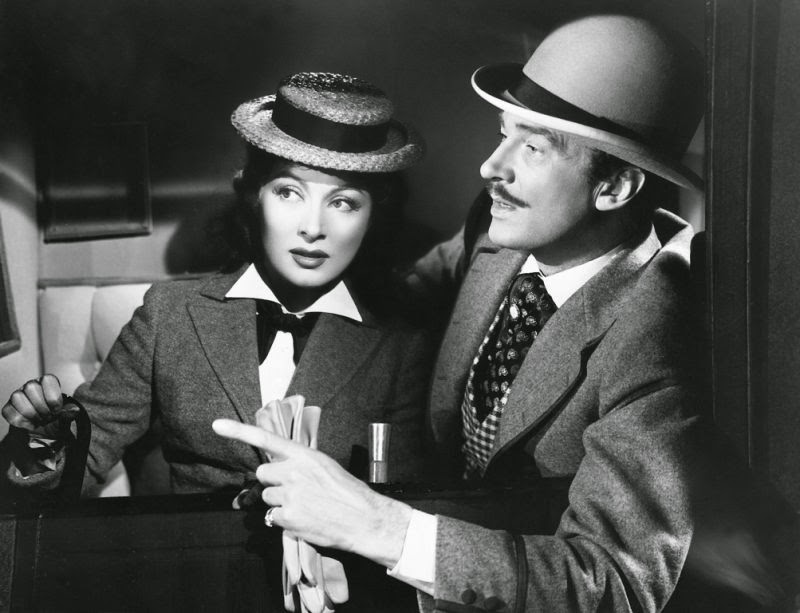Young and old viewers continue to relate to the 1944 film
Today, some of the only times people consider movies from the Golden Age of Hollywood are when flipping channels or viewing one in a class. Movies from that era are not often given much consideration or appreciation by mainstream media and citizens. These hidden gems are rarely, if ever, played on popular cable stations, besides the one channel dedicated to them, the Turner Classic Movies channel. There are many movies that involve modern ideas and have the same messages, or better ones, than the films of today. One of those movies of the past that delivers in multiple themes is the 1944 film, Mrs. Parkington.
This romance/drama, starring Greer Garson as the title character, starts with a family gathering of the Parkingtons. Garson’s character, Susie Graham Parkington, is first seen as the wealthy, aging matriarch, listening to her family bicker in their selfish, snobbish way. Susie’s main concern is that her great-granddaughter, Jane, portrayed by Frances Rafferty, is not present. However, after everyone has left, Jane does come and informs Susie that she is eloping with a young man who worked for her father. Hearing this, Susie requests Jane bring the young man back to meet him.
Meanwhile, Susie has a flashback of her first meeting, in the 1870s, and the beginning of her relationship with her husband, the famed Major Augustus “Gus” Parkington, played by Walter Pidgeon. After a rough start, Susie and Gus are married and Susie is taken under the wing of Baroness Aspasia Conti, played by Agnes Moorehead, one of Gus’ closest friends and his love interest before meeting Susie.
Over the years, shown through flashbacks, Susie and Gus go through many ups and downs, from losing an unborn child to dealing with Gus’s questionable business dealings. When Susie finds out what Gus has been doing in his business ventures and realizes their relationship has not been the partnership she thought it would be, she takes their children and leaves. This gives Gus time to realize how his pride has gotten in the way of what matters to him and he seeks out Susie. They work out their problem and agree to be full partners, both in life and in business.
After one more separation due to the loss of another child, Susie and Gus are once again reunited and remain so.
In the present, Susie finds out from Jane’s fiancée that Jane’s father, Amory, has been stealing money from his business and is facing prison if he is not able to get the money to replace what he has lost. Susie must decide if she will lend him the money, but only if the rest of the family agrees, as it is their inheritance she will be giving away.
When Amory appeals to the family he is berated by each member, except Jane who condemns them for their selfishness. Amory makes the decision to turn himself in, but making the decision in the face of the deplorable and disappointing behavior of her family, Susie makes her final decision, looking to her husband and partner in agreement.
This movie presents many themes that evoke hope, anger, joy and sadness. Susie and Gus’ relationship shows the strength love can have through the up and downs, while also showing how a person can only take so much when they are deceived.
Susie is portrayed as a strong, independent woman who is not controlled by her husband, given the time in which the film is set. Although she depended on an allowance from Gus, Susie had freedom to use it as she wished, not often a privilege during that period. There was a mutual respect and equality in Susie and Gus’s relationship, an issue that is still prominent in today’s world.
Another positive relationship portrayed in the film is the friendship between Susie and Aspasia. Even though Aspasia had loved Gus, a fact Susie was aware of, the two women were still supportive of each other. Aspasia was there for Susie when she was first whisked into the very different society in New York City and helped Susie acclimate to her new position.
The film also shows the pettiness, politics, harshness and unforgiving nature of those with money. Superficial problems, as well as social pressures of living in the upper echelon of society are represented. As shown in one scene when the Parkingtons throw a ball, but all the big-name families send their regrets because Gus had offended one of the biggest names on Wall Street earlier that day.
This movie is presented with poise and elegance, while also not putting a veil on the hardships and sometimes messiness or complications faced in a marriage. It shows how pride, concealment and prejudice can get in the way of making a relationship work. However, it shows the equality of responsibility between Susie and Gus within their relationship and that even though they have problems, they are unapologetically in love with each other.
As Susie states after one of their reunions, “One day I will show these to our grandchildren and tell them…that the little shepherd was broken on one of the many days that their grandfather and grandmother fell in love with each other.”
Overall, the movie offers a quality look at different relationships and how people can have more to their history and personality than meets the eye. It also offers the warm, fuzzy feeling of a cute romance and how love can endure over the years if two people are willing to stick with it and work out the problems they face together.
By Faith Topolsky, Staff Writer
topolsfl17@bonaventure.edu






